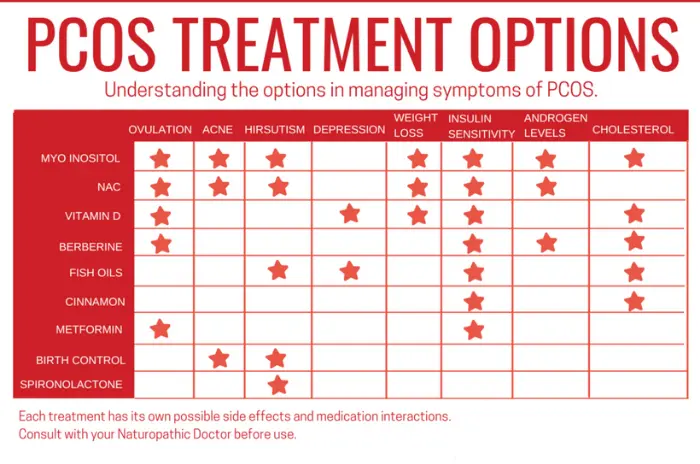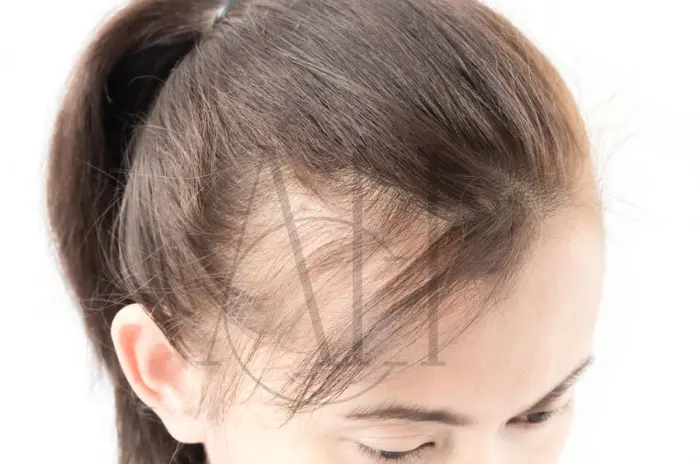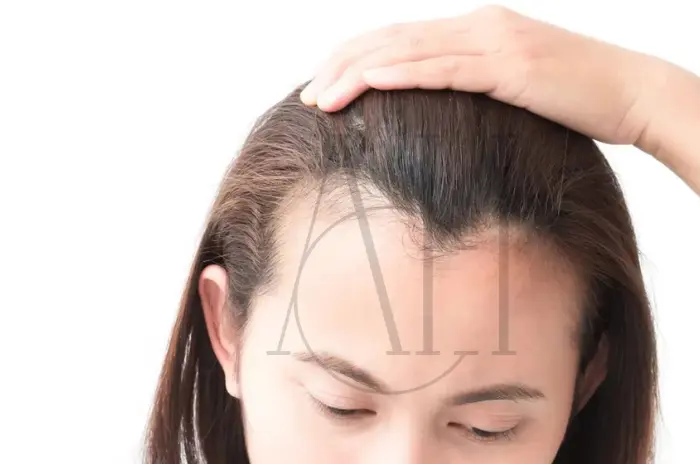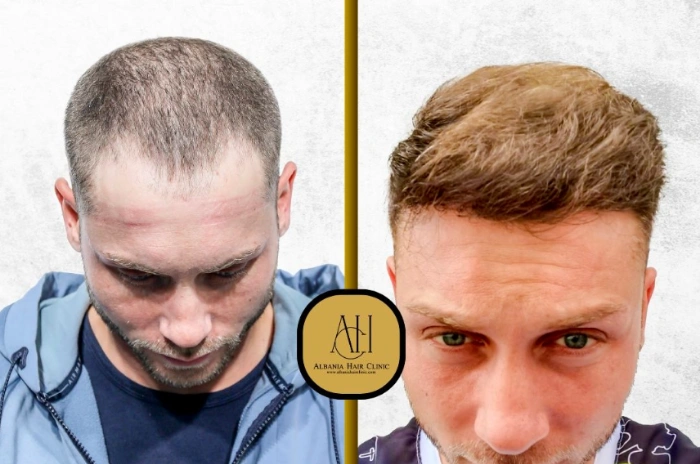Polycystic ovary syndrome (PCOS) affects millions of women worldwide, and one of its most distressing symptoms is hair loss. If you’re experiencing thinning hair or female pattern hair loss alongside other PCOS symptoms, you’re not alone. Understanding the connection between PCOS hair loss and hormonal imbalances is crucial for finding effective treatments and regaining confidence in your appearance.
PCOS hair loss occurs when elevated androgen levels, particularly DHT (dihydrotestosterone), affect hair follicles and disrupt the normal hair growth cycle. This condition can be emotionally challenging, but with proper medical management and lifestyle changes, many women successfully reverse PCOS hair loss and achieve healthier hair growth.
The journey to faster hair growth requires patience, consistency, and the right approach to hair care. From proper nutrition and scalp stimulation to avoiding damaging practices, every aspect of your routine plays a crucial role. Whether you’re looking to grow hair faster naturally in a week or establish long-term healthy habits, this comprehensive guide will provide you with scientifically-backed methods to maximize your hair’s growth potential.
Table of Contents
ToggleWhat Is PCOS Hair Loss?
PCOS hair loss is a common symptom of polycystic ovary syndrome that affects up to 70% of women with this hormonal condition. Unlike other types of hair thinning, PCOS hair loss follows a specific pattern similar to male pattern baldness, typically beginning at the crown and temples.
How PCOS causes hair thinning and shedding
- Elevated androgen levels: Women with PCOS produce higher levels of male hormones, particularly testosterone and its more potent derivative, DHT
- Shortened hair growth cycle: DHT and hair loss are directly linked, as DHT binds to hair follicles and gradually shrinks them over time
- Miniaturization process: Hair follicles become progressively smaller, producing thinner, weaker hair strands before eventually stopping hair production entirely
The link between hormones and hair loss in PCOS
- Insulin resistance: High insulin levels can increase androgen production, worsening hormonal hair loss PCOS
- Inflammation: Chronic inflammation associated with PCOS can damage hair follicles and impede healthy hair growth
- Nutritional deficiencies: PCOS often leads to deficiencies in iron, zinc, and vitamins that are essential for hair health
Signs and Symptoms of PCOS-Related Hair Loss
Recognizing PCOS hair thinning early is essential for implementing effective treatments before significant hair loss occurs. The symptoms often develop gradually and may be mistaken for normal aging or stress-related hair loss.
How to tell if PCOS is causing your hair loss
- Gradual thinning: Hair becomes progressively thinner over months or years, rather than sudden shedding
- Crown and temple recession: Hair loss typically begins at the top of the head and hairline, similar to male pattern baldness
- Increased hair shedding: You may notice more hair in your brush, shower drain, or on your pillow
PCOS hair loss vs. other types of hair thinning
- Pattern distribution: Female pattern hair loss from PCOS affects specific areas, unlike diffuse thinning from stress or nutritional deficiencies
- Accompanying symptoms: PCOS symptoms include irregular periods, weight gain, acne, and excess facial hair
- Hormonal markers: Blood tests showing elevated androgens, insulin resistance, and irregular ovulation patterns
Widening Part or Bald Spots
- Visible scalp: The part line becomes increasingly wider as hair density decreases in the crown area
- Thinning at temples: Hairline recession creates an “M” shape similar to male pattern baldness
- Reduced hair volume: Overall hair appears less full and lacks the thickness it once had
How to Treat Hair Loss from PCOS
Effective PCOS hair loss treatment requires a comprehensive approach addressing both the underlying hormonal imbalances and supporting hair follicle health. The most successful treatments combine medical interventions with lifestyle modifications.
Medical treatments for PCOS hair loss
- Anti-androgen medications: Spironolactone for PCOS hair loss is highly effective, blocking DHT receptors and reducing hair follicle miniaturization
- Topical treatments: Topical minoxidil PCOS therapy stimulates blood flow to hair follicles and extends the growth phase
- Hormonal therapy: Birth control pills and other hormonal treatments help regulate androgen levels
Natural remedies to reduce hair thinning with PCOS
- Dietary modifications: Reducing refined carbohydrates and increasing protein intake supports healthy hair growth
- Stress management: Chronic stress worsens PCOS stress and hair loss, making relaxation techniques essential
- Scalp care: Gentle massage and proper cleansing promote optimal scalp health and circulation
Best vitamins and supplements for PCOS hair regrowth
- Biotin and B-complex vitamins: Support keratin production and strengthen hair structure
- Iron supplementation: Correcting iron deficiency is crucial for vitamins for PCOS hair loss protocols
- Omega-3 fatty acids: Reduce inflammation and support healthy hair follicle function
| Medical Treatments for PCOS Hair Loss | Effectiveness | Time to Results | Side Effects | Cost |
|---|---|---|---|---|
| Spironolactone | High (70-80% improvement) | 3-6 months | Dizziness, irregular periods | Low-Medium |
| Topical Minoxidil | Moderate (50-60% improvement) | 4-6 months | Scalp irritation, unwanted hair growth | Low |
| Birth Control Pills | Moderate (40-60% improvement) | 3-12 months | Weight gain, mood changes | Low |
| Finasteride | High (60-70% improvement) | 6-12 months | Birth defects risk, mood changes | Medium |
| PRP Therapy | Moderate (50-70% improvement) | 3-6 months | Mild pain, temporary swelling | High |
| Laser Therapy | Mild-Moderate (30-50% improvement) | 6-12 months | None significant | High |
Medical Treatments to Stop PCOS Hair Loss
Medical management PCOS hair loss involves prescription medications that target the root causes of hair thinning. These treatments are most effective when started early and used consistently under medical supervision.
Prescription options: Spironolactone, minoxidil, and anti-androgens
- Spironolactone for hair loss: This potent anti-androgen blocks DHT receptors, allowing hair follicles to recover and produce thicker hair
- Minoxidil therapy: Available in 2% and 5% concentrations, minoxidil increases blood flow to hair follicles and extends the anagen (growth) phase
- Finasteride PCOS hair treatment: Though primarily used in men, low-dose finasteride can be effective for women under careful medical supervision
Advanced therapies: PRP (Platelet-Rich Plasma) and low-level laser therapy
- PRP treatments: Laser therapy for PCOS hair loss and PRP injections stimulate hair follicles using the patient’s own growth factors
- Low-level laser therapy: FDA-approved devices use specific wavelengths to energize hair follicles and promote regrowth
- Combination approaches: Many clinics combine multiple therapies for enhanced results
Birth control pills for PCOS: Do they help hair regrowth?
- Hormonal regulation: Birth control pills containing anti-androgenic progestins can reduce DHT production
- Estrogen benefits: Increased estrogen levels help counteract the effects of excess androgens on hair follicles
- Long-term use: Consistent use over 6-12 months is typically required to see significant hair regrowth

NHS-Recommended Treatments for PCOS Hair Loss
The National Health Service provides evidence-based guidelines for managing PCOS hair loss that focus on both hormonal regulation and direct hair loss treatments.
Medications to manage PCOS-related hair loss
- First-line treatments: The NHS typically recommends topical minoxidil PCOS therapy as the initial treatment option
- Anti-androgen therapy: Spironolactone for PCOS hair loss is prescribed when minoxidil alone is insufficient
- Monitoring protocols: Regular blood tests ensure treatments are working effectively and safely
How the contraceptive pill can help with PCOS symptoms
- Hormone stabilization: Combined oral contraceptives help regulate menstrual cycles and reduce androgen production
- Dual benefits: Pills containing cyproterone acetate provide both contraception and anti-androgen treatment PCOS
- Gradual improvement: Hair regrowth typically becomes noticeable after 3-6 months of consistent use
Metformin and its effects on PCOS hair loss
- Insulin sensitivity: Metformin improves insulin resistance, indirectly reducing androgen production
- Weight management: Better insulin control helps with weight loss, which can improve PCOS symptoms overall
- Complementary therapy: Metformin works best when combined with other hair loss from PCOS treatment options
Hair Care Tips for Women with PCOS
Proper hair care is essential for women with PCOS experiencing hair thinning. Gentle techniques and appropriate products can help preserve existing hair while supporting regrowth efforts.
Choosing Gentle, Sulfate-Free Shampoos
- Mild formulations: Sulfate-free shampoos clean without stripping natural oils that protect fragile hair
- DHT-blocking ingredients: Look for shampoos containing saw palmetto, ketoconazole, or other DHT-blocking compounds
- pH-balanced products: Maintain scalp health with products designed to preserve the natural acid mantle
Minimizing Heat Styling and Sun Exposure
- Heat protection: Always use thermal protectant products when using hot styling tools
- Air drying: Allow hair to dry naturally whenever possible to prevent additional damage
- UV protection: Wear hats or use hair products with SPF to protect the scalp from sun damage
Avoiding Tight Hairstyles to Reduce Breakage
- Loose styling: Avoid tight ponytails, braids, or buns that create tension on hair follicles
- Silk accessories: Use silk or satin hair ties and pillowcases to reduce friction and breakage
- Gentle brushing: Use wide-tooth combs and brush gently, starting from the ends and working upward
How to Stop or Reduce PCOS-Related Hair Loss
Learning how to stop PCOS hair loss requires a multifaceted approach that addresses hormonal imbalances, nutritional deficiencies, and hair care practices simultaneously.
Diet and lifestyle changes to support hair health
- Low glycemic index foods: Reducing refined carbohydrates helps improve insulin sensitivity and reduce androgen production
- Protein-rich diet: Adequate protein intake provides the building blocks necessary for healthy hair growth
- Anti-inflammatory foods: Omega-3 fatty acids, antioxidants, and other anti-inflammatory nutrients support overall hair health
Hair care tips for women with PCOS
- Gentle cleansing: Wash hair 2-3 times per week with mild, sulfate-free shampoos to avoid over-drying
- Scalp massage: Regular massage increases blood circulation and may help stop PCOS hair loss naturally
- Protective styling: Use techniques that minimize mechanical stress on hair shafts and follicles
Medical Treatments and Hormonal Therapy
- Comprehensive approach: Combine oral medications hair loss PCOS with topical treatments for maximum effectiveness
- Regular monitoring: Work with healthcare providers to adjust treatments based on progress and side effects
- Patience and consistency: Most treatments require 6-12 months of consistent use to show significant results
Lifestyle Changes to Manage PCOS Hair Loss
Managing PCOS symptoms through lifestyle modifications can significantly impact hair health and overall well-being. These changes work synergistically with medical treatments to optimize results.
Stress reduction techniques for better hair growth
- Meditation and mindfulness: Regular practice helps reduce cortisol levels that can worsen hormonal hair loss PCOS
- Adequate sleep: 7-9 hours of quality sleep supports hormone regulation and hair follicle repair
- Stress management: Yoga, deep breathing, and other relaxation techniques help break the cycle of PCOS stress and hair loss
Exercise routines that benefit PCOS and hair health
- Moderate intensity training: Regular exercise improves insulin sensitivity and hormone balance
- Strength training: Building muscle mass helps improve metabolism and reduce insulin resistance
- Cardiovascular exercise: Improves circulation, delivering nutrients more effectively to hair follicles
Hair care tips for women with PCOS
- Nutrient-dense diet: Focus on foods rich in iron and zinc for hair loss prevention and treatment
- Hydration: Adequate water intake supports overall hair and scalp health
- Avoid crash diets: Sudden weight loss can worsen hair thinning in women with PCOS
Nutritional support for PCOS and hair growth
- Balanced macronutrients: Ensure adequate protein, healthy fats, and complex carbohydrates in every meal
- Micronutrient optimization: Address deficiencies in iron, zinc, vitamin D, and B-vitamins that commonly affect women with PCOS
- Meal timing: Regular meals help maintain stable blood sugar and hormone levels

Can Hair Grow Back After PCOS Hair Loss?
Many women wonder if they can regrow hair with PCOS after experiencing significant thinning. The answer depends on several factors, including the extent of hair loss and how quickly treatment begins.
When Regrowth Is Possible
- Early intervention: Hair follicles that haven’t been completely destroyed can often be revitalized with proper treatment
- Combination therapy: Using multiple approaches simultaneously typically yields the best results for those hoping to reverse PCOS hair loss
- Hormonal stabilization: Controlling androgen levels is essential for creating an environment conducive to hair regrowth
Factors That Affect Hair Recovery
- Duration of hair loss: The longer PCOS hair loss has been occurring, the more challenging recovery becomes
- Overall health: General nutritional status, stress levels, and other health conditions impact hair regrowth potential
- Treatment compliance: Consistent use of prescribed medications and lifestyle modifications is crucial for success
Natural Remedies for PCOS Hair Loss
While medical treatments are often necessary for significant PCOS hair loss, natural remedies can provide valuable support and may help stop hormonal hair loss when used consistently.
Essential vitamins and supplements for hair regrowth
- Biotin supplementation: Supports keratin production and may improve hair thickness and strength
- Vitamin D: Deficiency is common in women with PCOS and can contribute to hair loss
- Saw palmetto: Natural DHT blocker that may help reduce androgenic alopecia when taken regularly
Dietary changes to improve PCOS hair health
- Mediterranean diet: Rich in anti-inflammatory foods that support overall PCOS hair loss treatment
- Reduced sugar intake: Limiting refined carbohydrates helps improve insulin sensitivity and reduce androgen production
- Increased protein: Ensures adequate amino acids for healthy hair growth and repair
Herbal remedies that may help with hair loss
- Green tea extract: Contains compounds that may help block DHT and support hair follicle health
- Pumpkin seed oil: Studies suggest it may help with female pattern hair loss treatment
- Rosemary oil: Topical application may stimulate circulation and promote hair growth
DHT-blocking shampoos and their effectiveness
- Ketoconazole shampoos: Antifungal properties may also help block DHT at the follicle level
- Natural DHT blockers: Shampoos containing saw palmetto, caffeine, or other natural inhibitors
- Regular use: Must be used consistently to see potential benefits for female pattern hair loss
Scalp massage and hair care routines
- Circulation improvement: Daily scalp massage increases blood flow to hair follicles
- Oil treatments: Natural oils like coconut, argan, or jojoba can nourish the scalp and hair
- Gentle techniques: Avoid aggressive manipulation that could damage fragile hair
Supplements That May Help Hair Regrowth
Hair loss vitamins and minerals play crucial roles in maintaining healthy hair growth cycles. Addressing nutritional deficiencies is often an important component of comprehensive PCOS hair loss treatment.
Iron and Zinc for Healthy Hair
- Iron deficiency: Common in women with PCOS, iron deficiency can significantly worsen hair thinning
- Zinc supplementation: Essential for protein synthesis and hair follicle health
- Proper dosing: Work with healthcare providers to determine appropriate doses based on individual needs
Careful Use Under Medical Advice
- Avoiding interactions: Some supplements may interact with medications for PCOS hair loss
- Monitoring levels: Regular blood tests ensure supplements are providing benefits without causing toxicity
- Quality products: Choose reputable brands with third-party testing for purity and potency
When to See a Doctor About PCOS Hair Loss
Seeking professional help early can make a significant difference in PCOS hair loss treatment outcomes. Knowing when to consult healthcare providers ensures you receive appropriate care before hair loss becomes severe.
Early warning signs that warrant medical attention include sudden increases in hair shedding, visible thinning at the crown or temples, and hair loss accompanied by other PCOS symptoms like irregular periods or weight gain. Dermatologists and endocrinologists can provide specialized care, including prescription anti-androgen treatment PCOS options and advanced therapies. Comprehensive evaluation should include hormone testing, nutritional assessment, and examination of the scalp and hair to determine the most effective treatment approach.
Hair Transplant for PCOS: When Is It Effective? (Revised)
Hair transplant PCOS procedures can be effective for women with stable hair loss who have exhausted other treatment options. However, careful consideration is needed to ensure optimal outcomes.
Candidacy criteria: Can women with active PCOS get transplants?
- Hormonal stability: PCOS symptoms must be well-controlled before considering surgical intervention
- Stable hair loss: Ongoing active hair loss makes transplantation less predictable
- Realistic expectations: Understanding limitations and potential need for future procedures
Combining transplants with hormonal therapy
- Continued medical treatment: Spironolactone for PCOS hair loss and other medications must continue post-transplant
- Protecting existing hair: Ongoing medical management PCOS hair loss preserves remaining native hair
- Long-term planning: Consider future hair loss patterns when designing transplant procedures
Is Hair Transplant a Solution for PCOS Hair Loss?
Hair transplant procedures offer hope for women with advanced PCOS hair loss, but they’re not suitable for everyone and require careful planning and realistic expectations.
When to Consider a Hair Transplant
- Exhausted other options: Medical treatments have reached their maximum benefit
- Significant hair loss: Substantial thinning that affects quality of life and cannot be adequately hidden with styling
- Stable condition: PCOS symptoms are well-controlled with minimal ongoing hair loss
Who Is a Good Candidate with PCOS?
- Controlled hormones: Androgen levels must be managed with anti-androgen treatment PCOS medications
- Adequate donor hair: Sufficient healthy hair in donor areas that aren’t affected by DHT and hair loss
- Realistic expectations: Understanding that transplants redistribute existing hair rather than creating new hair
Choosing the Right Hair Transplant Technique for Women with PCOS
Selecting the appropriate transplant method is crucial for achieving natural-looking results in women with female pattern hair loss related to PCOS.
FUE vs DHI for Female Pattern Hair Loss
- Follicular Unit Extraction (FUE): Minimally invasive technique suitable for smaller areas of hair loss
- Direct Hair Implantation (DHI): Allows for more precise placement and angle control, ideal for female pattern hair loss treatment
- Technique selection: Based on hair loss pattern, donor hair characteristics, and desired density
| Hair Transplant Techniques | FUE (Follicular Unit Extraction) | DHI (Direct Hair Implantation) |
|---|---|---|
| Procedure Method | Hair follicles extracted and implanted separately | Direct implantation without creating recipient holes |
| Recovery Time | 7-10 days | 5-7 days |
| Scarring | Minimal tiny dots | No linear scarring |
| Precision | Good | Excellent angle and direction control |
| Suitable for PCOS | Yes, for stable hair loss | Yes, better for female pattern hair loss |
| Cost | Medium | Higher |
| Session Duration | 6-8 hours | 8-10 hours |
| Graft Survival Rate | 85-95% | 90-98% |
What to Expect from a Transplant Procedure
- Pre-procedure preparation: Optimizing PCOS hair loss treatment medications and overall health
- Recovery timeline: Initial healing takes 2-3 weeks, with final results visible after 12-18 months
- Ongoing care: Continued hormonal hair loss treatment to protect both transplanted and existing hair
FAQ : PCOS Hair Loss Causes, Symptoms and Effective Treatments
What causes hair loss in women with PCOS?
PCOS hair loss is primarily caused by elevated androgen levels, particularly DHT, which miniaturizes hair follicles and disrupts normal hair growth cycles.
What are the common signs and symptoms of PCOS-related hair loss?
PCOS hair thinning typically presents as gradual hair loss at the crown and temples, increased daily shedding, and a widening part line similar to male pattern baldness.
Can hair loss from PCOS be reversed or regrown?
Yes, many women can reverse PCOS hair loss with early intervention using anti-androgen treatment PCOS, topical minoxidil PCOS therapy, and lifestyle modifications.
What medical treatments are available for PCOS hair loss?
Medical management PCOS hair loss includes spironolactone for PCOS hair loss, minoxidil, birth control pills, and advanced therapies like PRP and laser therapy for PCOS hair loss.
Are there any natural remedies or lifestyle changes that can help with PCOS hair loss?
Lifestyle changes for PCOS include stress reduction, regular exercise, a low-glycemic diet, and supplements like iron and zinc for hair loss prevention.
How do birth control pills help with PCOS hair loss?
Birth control pills containing anti-androgenic progestins help reduce DHT production and regulate hormones, supporting female pattern hair loss treatment.
When should I consider a hair transplant for PCOS hair loss?
Hair transplant PCOS should be considered only after PCOS symptoms are well-controlled and other treatments have reached their maximum benefit.
What hair care tips are recommended for women experiencing PCOS hair thinning?
Women with PCOS should use gentle, sulfate-free shampoos, avoid tight hairstyles, minimize heat styling, and incorporate scalp massage into their routine.






